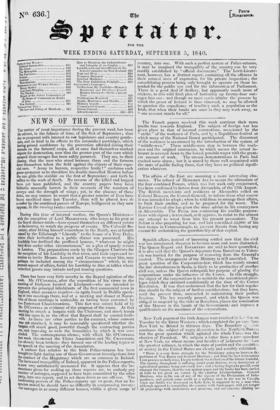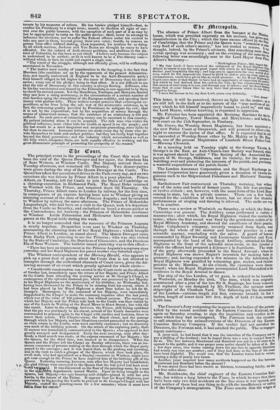New York papers of the l8th August were received in
Lordon on Tuesday by the Great Western ; which completed the paEsape from New York to Bristol in thirteen days. The Boundary (r.: 5tion continues tine subject of angry discussion in the Northern States; but the great question which agitated the whole Union was the election of President. We subjoin a letter from a correspondent at New York, on whose means and faculties of judgment we niece the greatest reliance, in which the state of parties and the condition of society in the United States are clearly and sensibly exhibited. "There is a very fierce struggle for the Presidency going on between the partisans of Van Buren and General Harrison ; and from the best information 1 can procure on both sides, I begin to think the reiileetion of the former doubtful. The country throughout is suffering under great distress, every description of agricultural produce being extremely low ; and a feeling begins to prevail, even amongst the farmers, that the war against paper and the banks has been carried at least to too great an extent by the existing Administration. General Harrison, who is the son of one of the signers of the Declaration of Inde- pendence, and gained some credit as to military man in the war in Canada, when our flotilla was destroyed on Lake Erie, is supposed to be a man who, although opposed to inundating the country with bank-paper, will yet temper all proceedings with moderation and prudence, and not convulse existing at-
terests by his measures of reform. He has besides pledged himself—first, to confine his Presidency to a single term ; second, to disclaim all right of con- trol over the public treasure, with the exception of such part of it as may by law be appropriated to carry on the public service; third, never to attempt to influence the elections, nor to suffer the Federal officers under his control to take any part in them, beyond giving their own votes ; fourth, to remove no person from office without stating, when requested, his motives for so doing.
In all which matters, Jackson and Van Buren are thought by many to have offended. On the subject of Anti-slavery petitions, and abolition in the dis• trict of Columbia' he has been as yet silent. I believe only because the subject is understood to be settled ; as lie is well known to be a Pro-Slavery man— without which, in fact, Ile could not expect a single vote.
"The result of the struggle, although not officially given, will be sufficiently ascertained in November.
"The matter most worthy of consideration in the foregoing, is the fact that Harrison (the candidate set up by the opponents of the present Administra- tion, and usually understood in England to be the Anti-Democratic party) feels himself obliged to bid higher in the cause of Democracy than his adver- saries; every one of his pledges being to that effect. It is not difficult to see that the tide of Democracy in this country is always flowing. Jefferson, who in his day was detested and abused by the Federalists, is now appealed to by them to check its onward course. Yet the Hamiltons, Trollopes, and Marryats, fancied they saw here a rising aristocracy, in the circumstance of a certain number of rich families aping the absurdities of the European nobility, and spending their money with profuse folly. These writers cannot perceive that extravagant ex- penditure, so fbr from being the sole test of the aristocratic existence, is, in fact, the redeeming quality provided by Providence to mitigate the evil ; that it is not by the expenditure, but by the acquisition of money through the
means of subservient masses, that the existence of an aristocracy is felt and
suffered. No such poiver of extracting money can be exercised in this country. By patient industry alone it can be acquired. The rich man who wishes for political influence, most either hide his wealth or spend it on the people ; and
the last would be a most dangerous and suspicious proceeding, more liable to fail than to succeed. Immense fortunes are made every day by those who de-
vote themselves to trade and eschew politics; but they are rarely kept together beyond the third generation ; and the industry which accumulates as well as the folly which dissipates them, are both equally effective in working out the great Democratic principle of promoting the prosperity of the masses.'



























